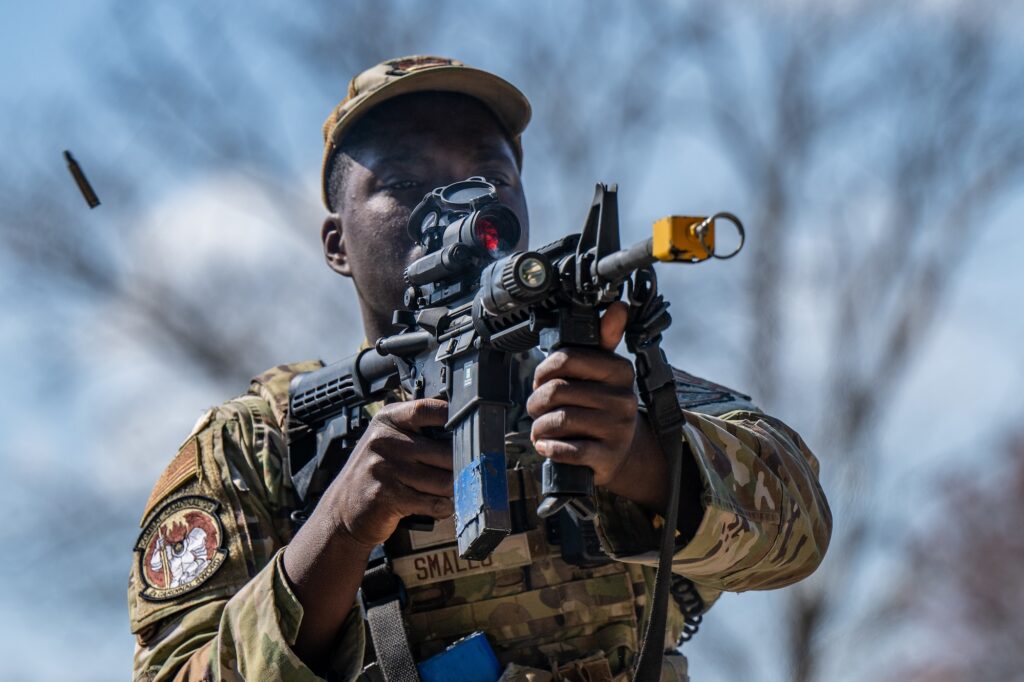- Published
- By Airman 1st Class Tyler A. P. Moody
- 375th Air Mobility Command
SCOTT AIR FORCE BASE, Ill. —
Airmen from the 375th Air Mobility Wing demonstrated their readiness skills during a combined mobility and mission assurance exercise called “Combat Cardinal,” which took place March 7 – 15.
Combat Cardinal was divided into two efforts: “Cardinal Sword” exercised the ability to rapidly deploy to meet any combatant commander’s requirements, and “Cardinal Shield” tested the wing’s ability to respond to crisis response and force protection scenarios at home station with fewer Airmen.
“We designed it this way so we could work on the fundamentals that allow us to ‘explode into theater’ as part of Air Mobility Command’s objective to equip all of its wings with the capability to not only execute mobility fundamentals, but execute them flawlessly and with speed. Once at the location, we would operate in that contested environment with the ability to disperse and aggregate as needed,” said Col. John Poole, 375th AMW commander. “This exercise format also allowed us to work through threats and adversary injects at our home station [to practice] protecting our assets and close on our objectives.”
Cardinal Sword
For Cardinal Sword, the wing simulated processing and sending 300 Airmen overseas. With weapons issued and buses loaded, they deployed to a cantonment site on base that represented their forward location. Additionally, two deployed hub locations were created to simulate the “hub and spoke” logistics built into the Air Force’s deployment model.
The locations tested Airmen’s skills in operating out of barren contested environments, with Wing Inspection Team members developing threat scenarios as injects that they may encounter from enemy forces.
Airmen, regardless of their specialty, pitched in to construct semi-permanent tents that the 375th Logistics Readiness Squadron transported to the site. Medical personnel coordinated to assemble what would become the location for treating simulated injuries. Meanwhile, members from the 375th Force Support Squadron assembled a Single Pallet Expeditionary Kitchen, or SPEK, to feed those at the cantonment site.
Scott’s Detachment X, which oversees the wing’s small-Unmanned Aircraft System program, provided compound security such as getting a visual overview of the battlefield and identifying the locations of potential adversaries. A specific exercise inject recalled by Capt. Matthew Bolton, Det. X director, involved a vehicle-borne improvised explosive device, or VBIED.
“[The vehicle] came to one of our ECPs (entry control points), so we flew the drone to get a good look inside to find that it two IEDs inside. [Having this capability] is honestly something that could save real lives in the field,” said Bolton.
Thanks to Altus Air Force Base in Oklahoma, a KC-46 refueler landed at one of the simulated forward deployed locations to provide a platform to evacuate the wounded. Having this airframe for the exercise added an extra opportunity for Aeromedical Evacuation specialists to hone their time-sensitive, and mission critical care for those injured in combat.
During the mass casualty portion of the exercise, medical teams set up an en route patient staging system where Airmen were stabilized before transport aboard the aircraft. AE teams worked to coordinate with multiple agencies the rapid movement of these patients with minimal information in order to get them to their next higher level of care. While aboard the flight, AE specialists along with a three-person Critical Care Air Transport Team, provided advanced care to those critically injured who required continuous stabilization during transport.
Deployed commander, Col. Richard Kind, expressed his overall impressions of how the week went by sharing that “our Airmen are incredible. Our Airmen are ready. And, our Airmen will ‘Deliver Victory.’”
Our Airmen are incredible. Our Airmen are ready. And, our Airmen will ‘Deliver Victory.’
Col. Richard Kind, 375th Air Mobility Wing deputy commander
Cardinal Shield
Meanwhile, those who weren’t part of the deployed mission had a role to play during Cardinal Shield, and the Inspector General team didn’t hold back on the scenarios. The wing practiced responding to a simulated bomb threat, to potential violent protesters arriving at the base and to an active shooter incident. While none of these crisis response scenarios were anything new for the 375th AMW, the real test was exercising these skill sets while missing 300 key personnel. As with any large-scale movement of equipment and manpower, home station capabilities can become stretched.
Poole said, “In a real conflict, you don’t just deploy and then nothing happens stateside. So, as we operate this Flagship at home with degraded resources, we have some additional responsibilities we need to test. We must ensure the ongoing defense of the base and ensure the connectivity of the global C2 (command and control) structure. So, that’s really the point of this exercise—to practice both at the same time. That’s how a real conflict would unfold.”
Overall, both aspects of Combat Cardinal exercised critical readiness skills for the entire wing. Lessons learned from this will be gathered and then applied to future exercises and real-world deployments that are on the horizon for the 375th AMW.
“We’ve come a long way in meeting our objectives to hone our combat capabilities, focus on how we can have a competitive edge, shore up our assets to defend against cyber attacks and exploit our aeromedical evacuation proficiency. It was a true team effort, and we’ll continue to build on our successes and lessons learned. I’m proud of this team and what they’ve accomplished.”




